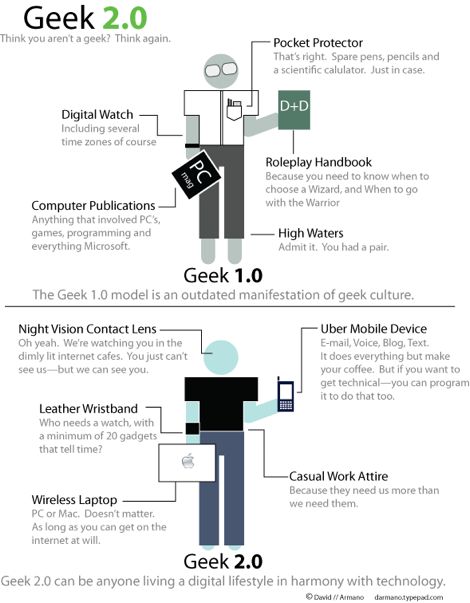Do they still need us more than we need them?

I saw the following cartoon about a year ago showing "Nerd 2.0," evolved from the high-water-wearing, pocket-protector-sporting, taped-glasses-seeing geek into a casual, well-gadgeted guy who can dress the way he wants because "they need us more than we need them." From a guy who rarely tucks in his shirt, let alone puts on a tie and considers his eVest to be all the jacket he needs, I practically live by this mantra, at least with respect to my fashion sense.
However, are techies what they used to be in terms of value to schools? How many students, stipended teachers, parents, volunteers, or average Joes can handle most tech support tasks? This is not so much the case at a university level where real enterprises exist, but even large school districts with IT enterprise/infrastructure should be empowering teachers and students to handle their own low-level problems. I think it's pretty safe to call basic maintenance an essential 21st Century skill.
So can us techies still get away with casual attire, pouring down Red Bull in the hallways, and grumping about the halls because we know our jobs are secure? The answer is no. I don't plan on tucking in my shirt any time soon (we all have our limits, right?), but I absolutely must add value to the organization that the average kid or Windows power user can't.
This also doesn't mean hording my knowledge of information systems to ensure that everything will fail if I leave. On the contrary, openness and transparency is a major asset that the more experience among us can bring to the organization. Who better to train and empower end users than us? My "hit-by-a-bus-file" (a living, growing document that sits with our central office staff includes everything someone would need to know if I were ever hit by a school bus) will make our systems live beyond me and my staff.
How else can we add value? Anyone can fix a Windows computer, but it takes experience, leadership, and insight to design curricula and ensure that our students are prepared with not only essential job skills but critical technology insights to differentiate themselves from their Asian and Eastern European counterparts.
To be honest, our jobs now mirror those in private industry. Those tasks that are rote, mundane, or merely maintenance-oriented can be "outsourced" (whether to consulting groups or really cheap techs). Those tasks that are strategic and creative will keep us employed and make us integral parts of the changing face of education.
